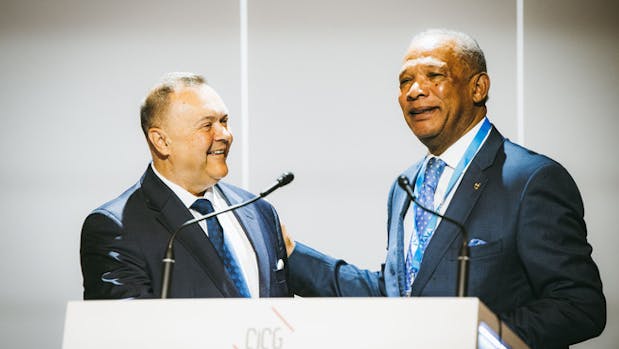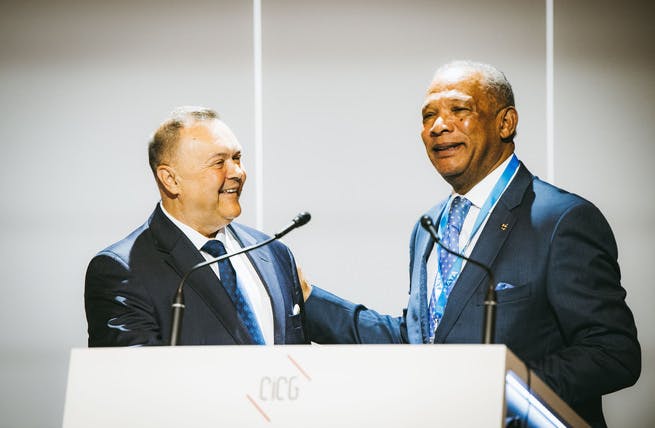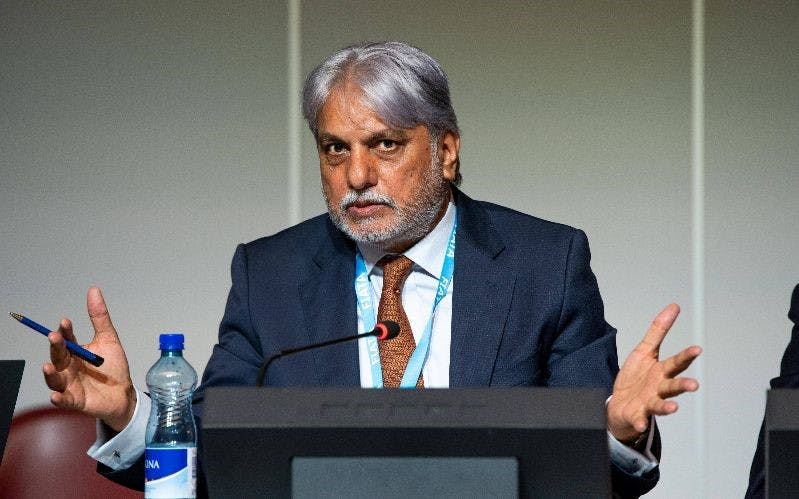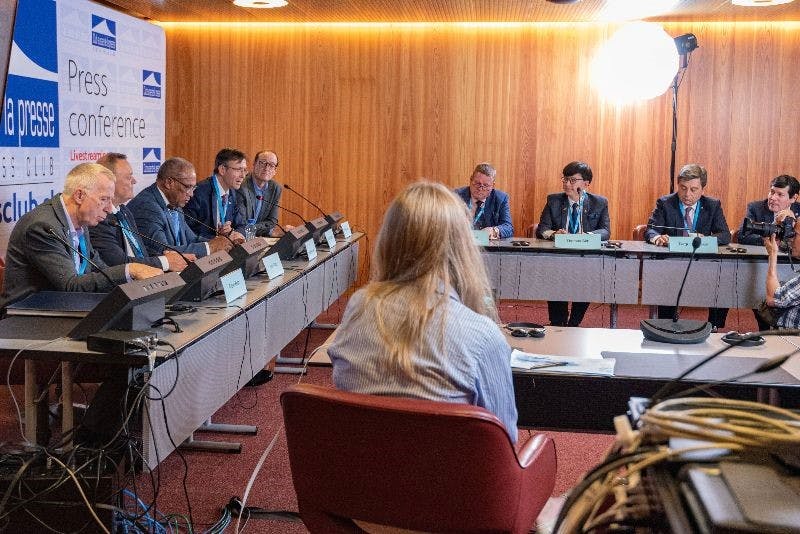FIATA HQ Meeting 2022 Recap: Day 1

Day 1 of the FIATA HQ Meeting set off to a sailing start with an emotional Opening Session, including the exchange of the Chain of Office from the Immediate Past President to the new President. The welcome of members by Director General Stéphane Graber to the beautiful city of Geneva, in which he grew up, highlighted the excitement of the chance to meet once again in-person to share in challenges, grow and learn. He made sure the emphasis that this is FIATA members' new home and that they are always welcome here as FIATA family members. President Ivan Petrov then opened the session to all FIATA members present, both online and in-person, with a motivational speech on the relevance of the freight forwarding community, and the key role they play in the global supply chain.

Regions Session 'Critical Trade Issues and Capacity Development: Identifying Ways to Work Together as World Regions to Facilitate Global Trade'
RAME Chair Salahadin Khalifa shared his appreciation for previous Chair David Phillips, spoke of the lessons we must learn from the pandemic, and the importance of travel across continents to learn from each other and work together.
RAMs Chair Jorge Heinermann highlighted the difficulties faced by the current unfair advantages in terms of competition with carriers on the maritime front, a problem which is particularly troubling South America's growth possibilities. He noted the importance of working together to overcome the problems caused by big shipping lines taking the largest market shares.
RAP Chair Yukki Hanafi spoke of the importance of his Region in global logistics with the largest global population, which needs to be fed and supported, but which also has a lot to give. Geopolitical boundaries may pose a threat to growth, and conflict between nations, but that a contemplation on all sides should be had to collaborate with their neighbours.
REU Chair Antonella Straulino pushed home the success of the digitalisation steps taken during the pandemic, and the benefit this had had on members, and that it was a great opportunity to show the world what freight forwarders do and can do for daily lives. She emphasised the importance of coming together as global Regions to solve things together.
Digitalisation was addressed as a key focus point for each Region.

When the audience was asked to address the key challenges ahead, various members noted that high freight rates are a good opportunity for freight forwarders. It was agreed that attracting trained labour is still an issue and that the challenge faced by cyberattacks. Past President Babar Badat spoke of how important the reset programme was to allow FIATA to establish itself and show its weight. This is particularly nurtured by the new home of FIATA in Geneva amongst other international organisations.
Invited guest speakers Azhar Jaimurzina of UNESCAP, Christina Wiederer of the World Bank Group, Dr Mohammad Saeed of the ITC and Lukasz Wyrowski of the UNECE were invited to bring their external perspectives on the current global challenges faced by freight forwarders. Ms Jaimurzina echoed Mr Hanafi's statement on the need to streamline and revolutionise processes post-pandemic where it was particularly evident in Asia.
Dr Mohammad Saeed shared that without competitive rates, forwarders cannot grow. Productive and logistics efficiency (especially cross border trade) both influence the competitiveness of a product equally. He noted that freight forwarders contribute more than 10% of the GDP of the world, and that they need to function as one united voice in the international arena.
He suggested a few things which forwarders should consider:
More interaction between forwarders and small and medium-sized enterprises at both national and international level. The need to establish a digital platform for selling their services (the ebay of the freight forwarding world).
Sustainability related policies: we have to take the front seat whether we like it or not, investing in technology to decarbonise the entire supply chain, forwarders should be the drivers of change.
The session was also an excellent opportunity for Regions to hear about the World Bank Group Logistics Performance Index (LPI) Report published biennially, which had a four year hiatus due to the pandemic. Ms Wiederer garnered support for this year's survey, thanking FIATA's members for their participation as key contributors. The document influences government decisions and is thus an essential survey to take part in (read more in the latest FIATA Review, p. 25). This time, the survey will have two parts: the survey, and the data received from air cargo, container shipping and more contributors, including those received from other partners. The survey with FIATA will be purely online with no in-person interviews. It has also been shortened and a section has also been added on COVID-19 implications. The survey should take 5-7 minutes to complete. Stay tuned for more updates!
'Global supply chain disruption: FIATA mobilises its 40,000 members'
In cooperation with the Swiss Press Club, FIATA held its first Press Conference in THE international Geneva. FIATA Director General Stéphane Graber introduced the Federation to the Geneva journalists, who are familiar with the international organisation scene, with journalists joining online from The Loadstar and Transport Topics from their respective USA bases.
A brief presentation was given by him on the strategic aspects of FIATA's work as a freight forwarding association, after which he introduced FIATA President Ivan Petrov to take the floor to introduce the current priorities of FIATA's, including digitalisation, multimodality, its reach and impact on the global supply chain, and how forwarders remain essential in this.
Watch the FIATA Press Conference.

ABLM Session on 'Legal Aspects of the Use of Electronic Transport Documents' and 'Building Best Practices for the Use of Electronic Contracts'
The ABLM Session started off with a summary of the FIATA Body's activities by Chair Richard Gluck. Among other topics, it is working in cooperation with ABIT on the legal aspects of the paperless FIATA Bill of Lading, and has continued to be active at the international level to work towards the underlying legal framework, which formed the focus of the session. Insightful input was provided by speakers Regina Asariotis (UNCTAD) and Luca Castellani (UNCITRAL) – both of whom having longstanding expertise in shaping the international legal basis for digital contracts – and Christian Gyntelberg (DCSA) bringing the perspective of industry initiatives.
Ms Asariotis noted that the legal framework regarding electronic bills of lading has lagged behind the rapid technological developments, and the need for greater uniformity and recognition around the world. Legislative progress was welcomed in certain countries, including the recent announcement of the draft bill on electronic trade documents being now firmly on the legislative agenda according to the Queen’s Speech.
Mr Castellani noted the adoption of the Model Law on Electronic Transferable Records (MLETR) in over 100 states, and its implementation in 7 jurisdictions, providing new perspectives on the possession and transfer of goods. He emphasised that the MLETR had become the symbol of digitisation of trade-related flows, and that access to funds have also been a strong driver due to trade finance and gains in efficiency. He also shared the considerable work of UNCITRAL to provide assistance to ensure the system is possible for all, ensuring that no country will be left behind.
From the private sector perspective, Mr Gyntelberg shared information conducted by the FIT Alliance, of which FIATA is part, and the importance making available open digital standards for all. Despite the dawn of emails, it was noted that 99% of the process remains physical today, with only 1% of bills of lading being issued electronically. With the multiplicity of platforms, interoperability was cited as crucial.
